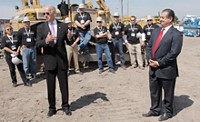Advertisement
Grab your lab coat. Let's get started
Welcome!
Welcome!
Create an account below to get 6 C&EN articles per month, receive newsletters and more - all free.
It seems this is your first time logging in online. Please enter the following information to continue.
As an ACS member you automatically get access to this site. All we need is few more details to create your reading experience.
Not you? Sign in with a different account.
Not you? Sign in with a different account.
ERROR 1
ERROR 1
ERROR 2
ERROR 2
ERROR 2
ERROR 2
ERROR 2
Password and Confirm password must match.
If you have an ACS member number, please enter it here so we can link this account to your membership. (optional)
ERROR 2
ACS values your privacy. By submitting your information, you are gaining access to C&EN and subscribing to our weekly newsletter. We use the information you provide to make your reading experience better, and we will never sell your data to third party members.
Environment
Battery Beginnings
Breaking Ground: Dow venture starts work on lithium-ion battery plant
by Melody Voith
June 28, 2010
| A version of this story appeared in
Volume 88, Issue 26

Vice President Joseph Biden visited Midland, Mich., last week to help break ground on a new Dow Kokam lithium-ion battery plant. Half the cost of the facility’s first phase will be paid for with a $161 million Department of Energy grant, which is part of the funds from the American Recovery & Reinvestment Act of 2009.
Construction of the facility actually began last month, so the dignitaries on hand—including Biden, Dow Chemical CEO Andrew N. Liveris, Michigan Gov. Jennifer Granholm, and Dow Kokam CEO Ravi Shanker—held a mock ground-breaking ceremony by lighting up signs shaped like lightning bolts.
In his remarks, Biden characterized the federal government’s investment in the facility as “seed money.” He said that DOE is working to “dramatically change the way we produce and use energy” and that the Dow Kokam plant is part of an effort to “launch entirely new industries and create jobs in a virtuous cycle of innovation.”
The plant will manufacture prismatic lithium-ion battery cells and packs mainly for the transportation industry, with secondary uses in utility storage and defense. The facility’s first phase, set to open in 2012, will have an annual capacity of 600 million watt-hours—equivalent to the battery power needed to run 30,000 all-electric vehicles—and will employ 320 workers.
Dow Kokam was established in 2009 as a partnership between Dow; TK Advanced Battery, which owns a stake in the battery maker Kokam; and the French firm Dassault, which makes electric-vehicle power systems. In addition to the federal funds, Dow Kokam received $180 million in tax incentives from the state of Michigan.
“The government seed money helped us catalyze this effort,” Ravi Ramanathan, vice president of business development at Dow Kokam, tells C&EN. “This is a very capital-intensive industry. When we talk about making batteries, it’s not for the faint of heart.”
In addition to capital concerns, Dow Kokam and other battery manufacturers might find a dearth of customers for their products, warns Jacob E. Grose, a senior analyst at Lux Research. “Our best estimates for electric-vehicle sales—unless gas prices unexpectedly spike—show that they won’t scale up at the rate needed to use all these batteries,” he says.




Join the conversation
Contact the reporter
Submit a Letter to the Editor for publication
Engage with us on Twitter